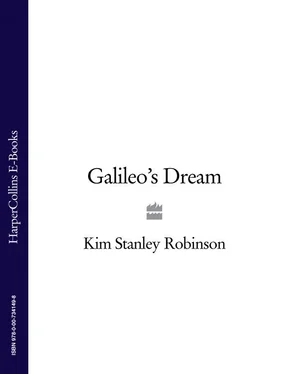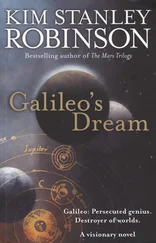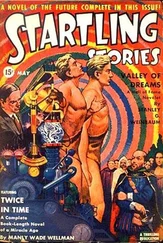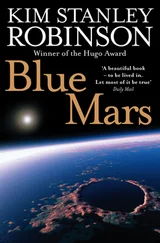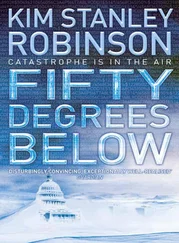While this was going on Mazzoleni was also making cardboard tubes that would snug into his main tubes of leather and staves, giving them the ability to adjust the distance between the lenses and thus sharpen the image. The eyepieces were smaller, so they put the drawtube at that end, and fitted it with felt shims.
To find out what degrees of magnification they were getting, Galileo affixed a gridwork to a whitewashed part of the garden wall. This enabled him to measure accurately the difference between the enlarged image of the grid and the image he saw through the other eye at the same time.
On the afternoon of the seventeenth of August, Galileo examined their three best performers. All were about the same length, which was just over a braccio, as measured by their in-house yardstick. Studying the notes, Galileo compared all their dimensions, scribbling more notes as he did so.
All at once he laughed out loud. One of his special moments had come again, a flash of sudden insight at the end of a period of investigation, giving him a jolt and a shiver, as if he were a bell and the clapper had just tapped him. He shouted, ‘MAT ZO LEN EEEEEEE!’
The old man appeared, more dishevelled and whiskery than ever, red-eyed with lack of sleep. ‘Look!’ Galileo commanded. ‘You take the focal length of the objective-for this one, a hundred minims-and you divide that by the focal length of the eyepiece-in this case eleven minims-and you get a number which identifies the power of magnification of the device, thus here about nine times! It’ s a ratio! It’s a ratio, it’s geometry again-’ He seized the old man by the shoulder: ‘Not only that, but look! Subtract the eyepiece focal length from the objective focal length, and you get the distance apart that the lenses are when the thing is focused properly! In this case, just short of one braccio. It’s a simple piece of subtraction!’
At this realization he grew somewhat glorious, as he often did when he was able to say new things of that sort. He congratulated everyone in the household, called for wine, threw crazia and other small coins at the servants and students who poured out into the courtyard to join the celebration, hugged them one by one while he was giving thanks to God and also indulging his most boastful humour, which was something to witness. He praised his genius for coming through for him again, he danced, he laughed, he grabbed Mazzoleni by the ears and shouted in his face:
‘I’m the smartest man in the world!’
‘Probably so, maestro.’
‘The smartest man in history!’
‘That’s how much trouble we’re in, maestro.’
This kind of poke in these moments of glory would only make him laugh and toss Mazzoleni aside, to be able to continue his jig. ‘Florins and ducats, crowns and scudi, I’ll buy Rachel and I’ll buy Trudi!’
No one in the household understood quite why he believed the glass was going to make him rich. The servant girls thought he meant to use it to watch them doing the laundry down at the river, which he did already from what he thought was a discreet distance.
Eventually everyone went back to work. Mazzoleni was left holding the glass, shaking his head at it. ‘Why should there be such proportions?’ he asked.
‘Don’t ask why.’ Galileo snatched up the glass. ‘Why is what our philosophers ask, and that’s why they’re so full of shit. Because we don’t know why. Only God knows why. If He does.’
‘All right, I know. Just ask what, just ask how. Still. You can’t help but wonder, can you.’ Waving at the new page of Galileo’s folio, filled with diagrams and numbers. ‘It seems so…’
‘So neat? Yes. Quite a coincidence, for sure. Quite the what-have-you. But it’s just more proof of what we already knew. God is a mathematician.’
As a mathematician himself, Galileo found saying this sentence immensely satisfying; often it was enough to bring tears to his eyes. God is a mathematician. He would emphasize the thought by taking a hammer to their anvil. And indeed the thought rang him like a bell. He would bring his hands together as if in prayer, and take a deep breath and expel it tremulously. To read God like a book; to solve him like an equation; it was the best sort of prayer. Ever since that time when he was a boy, he would explain, when he had looked up in church and seen a lamp swinging on its chain, and realized by timing it to his pulse that it took the same time to make its sweep back and forth no matter how far it was swinging, he had felt the direct touch of God in all these things. There was a method to His madness, clearly, and that method was mathematics. This was a comfort when the madness seemed all, as when he was sick, or in pain, or struck down by melancholy; or witnessing the effects of the plague; or contemplating the immense realm of human wickedness. Then his only comfort was the world’s inherent geom-etries.
The day for his Venetian demonstration approached, and their best tube showed things nine times larger than the eye saw it. Galileo wanted better, and thought he knew how to get it, but time had run out. For now, nine times bigger would have to do.
He had Mazzoleni’s crew cover the exterior of the best tube with red leather, embossed with decorative patterns in gold filigree. Mazzoleni also adapted a tripod stand that they sold as an accessory to the military compass, so that they would have something to hold the spyglass steady. A joint on top of the tripod was made of a metal ball held captive in a hemispherical cup, with one screw through the cup to tension the ball, which was screwed on top into a brass sleeve wrapping the spyglass. Using the tripod one did not have to hold the glass steady while looking through it, something no one could do for more than a second or two. It vastly improved the view through the glass.
The resulting arrangement was a handsome thing, standing there gleaming in the sunlight, strange but purposeful, immediately intriguing, pleasing to both eye and mind. A month earlier there had been no such thing in the world.
On 21st August, 1609,he ferried in to Venice on the morning barge, the looking glass and its stand in a long leather case slung from a strap over his shoulder. Its shape was suggestive of a pair of swords, and he saw the glances of people looking at it and thought, Yes, I’m going in to cut the Gordian knot. I’m going in to cut the world in two.
Venice stood on the lagoon, its usual grubby midday self. Magnificence at low tide. Galileo got off the ferry at the molo at San Marco, and was greeted there by Fra Paolo. The great friar looked gaunt in his best robes, his face still a wreck, as it always would be; but his crooked smile remained kindly, his look still penetrating.
Galileo kissed his hand. Sarpi patted the case gently: ‘So this is your new occhialino?’
‘Yes.’
‘Very good. Your audience is assembled in the Anticollegio. It’s everyone who matters, you’ll be happy to know.’
An honour guard assembled in response to Sarpi’s nod, and escorted them into the Signoria, up the Golden Staircase into the Anticollegio, which was the anteroom to the Signoria’s bigger halls. It was a tall chamber, sumptuously decorated overhead in the usual Venetian style, its octagonal ceiling covered with giltframed paintings allegorizing the origin myth of Venice, while the floor underfoot was painted like the pebbled bed of a mountain stream. Galileo had always found it a strange space, in which he had trouble focusing his eyes.
Now it was stuffed with dignitaries. Better yet, as Galileo soon learned, the Doge himself, Leonardo Dona, was waiting in the Sala del Collegio, the larger assembly hall next door that was the most sumptuous room in the Signoria. As he entered the room he saw Dona and the Savi, his six closest advisors, along with the Grand Chancellor and other state officials, all gathered under the long painting of the battle of Lepanto. Sarpi had outdone himself.
Читать дальше
